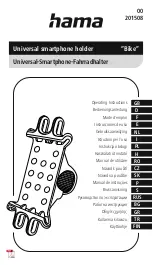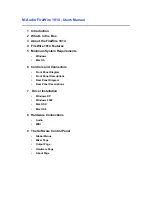
60
3. Listen carefully as propane
begins to flow. If a “hissing” sound
is heard for more than one or two seconds, close valve and
search for a potential leak. Solve leak before proceeding.
4. Light appliances as needed and directed in Chapter 5
–
Appliances.
Checking for Leaks
The entire propane distribution system and appliances have gone
through complete factory and dealer tests for any leakage. When
traveling with your RV normal vibrations and road movement may cause
connections to loosen and develop leaks.
For normal maintenance, we advise all owners to test for leakage at least
once per year or more often. You may request your dealer to perform a
maintenance check each spring.
Should you encounter an odor, possibly propane, turn off any and all open
flames and begin a systematic search for leaks on the complete propane
system.
NEVER USE A MATCH
. Use a soapy water solution which
contains
NO AMMONIA or CHLORINE
to search for leaks. If a leak is
identified, bubbles will appear. ALWAYS use 2 open end wrenches, when
tightening or loosening brass connections to prevent twisting of copper
tube.
For your own protection, the preceding warning labels have been placed
near the cooking area to remind you of the need of oxygen for combustion
and breathing. Due to smaller area in your recreational vehicle, there is
less oxygen than in your home. Proper ventilation is required when
cooking.
BE SURE you, as the owner, knows the odor of propane
IT IS NOT SAFE TO USE COOKING APPLIANCES FOR
COMFORT HEATING.
Cooking appliances need fresh air for safe operation.
Before operating:
1.
Open overhead vent or turn on exhaust fan.
2.
Open window.
FAILURE TO COMPY COULD RESULT IN DEATH OR SERIOUS
INJURY.
Portable fuel-burning equipment, including wood and
charcoal grills and stoves, should not be used inside the
recreational vehicle. The use of this equipment inside the
recreational vehicle may cause fire or asphyxiation.
















































